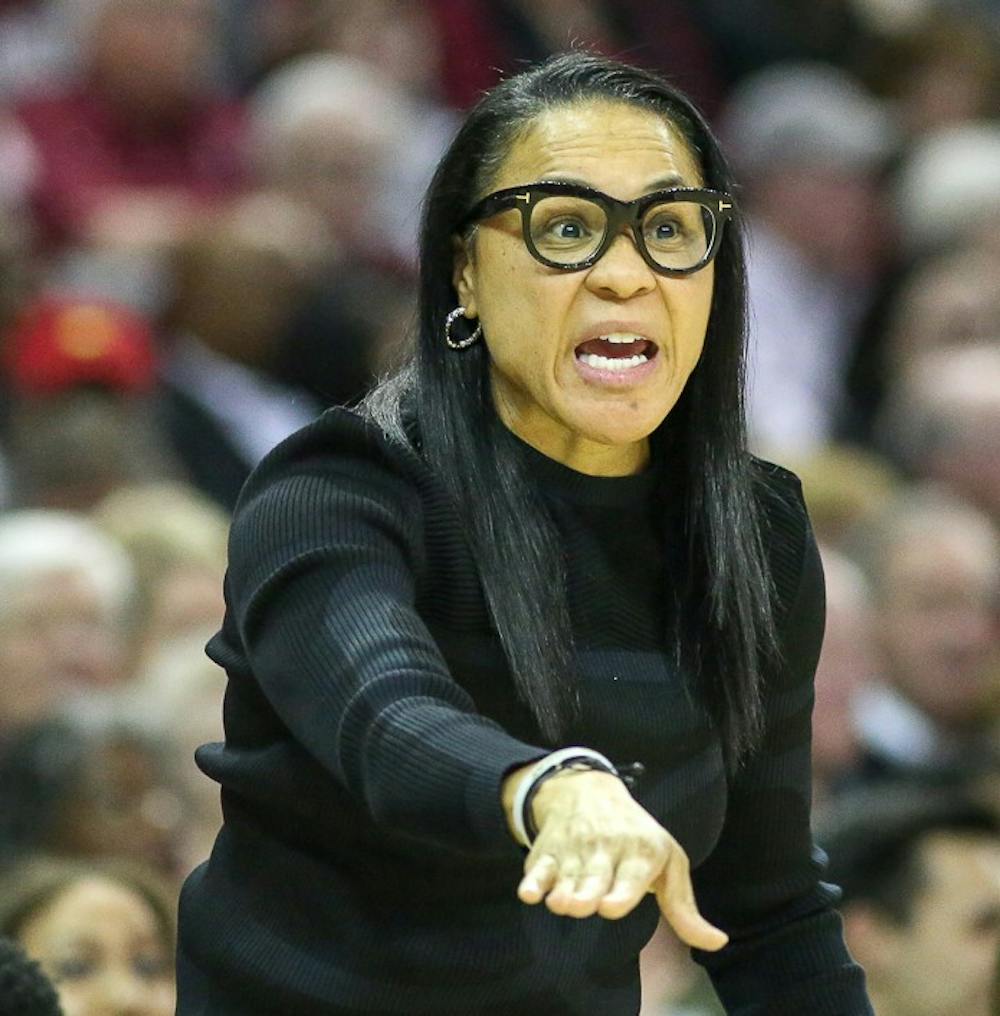As one of the greatest student-athletes to ever step on Grounds — often considered the best female Virginia athlete of all time — Dawn Staley’s legacy and impact in Charlottesville will never be forgotten.
The current national championship-winning head coach of the South Carolina women’s basketball team arrived at Virginia as a freshman in 1988 to a highly successful program under the direction of former coaching legend Debbie Ryan. Prior to Staley’s time in Charlottesville, the Cavaliers had reeled off five consecutive seasons with more than 20 wins, culminating in a trip to the Elite Eight in 1988. However, the excitement and buzz that often accompanies successful programs was not there for Virginia, as average attendance at home games hovered around 1,000. It was Staley who brought the spark.
Despite being a freshman, Staley made an immediate impact on the floor, scoring 16 points in her first game as a Cavalier before going on to average 18.5 points per game for the season — a number that at the time was the second-highest in Virginia history. While her freshman campaign was statistically special, it was the following years that set her apart in Cavalier lore and made her a pioneer for Black women in sports.
"So many of the things that Dawn did were just naturally what Dawn was about,” Ryan said. “So her personality became a national symbol of what women's basketball should be about. I think that's the thing that makes me the most proud of Dawn Staley and that the University of Virginia played a small part in her life."
After 10 losses in the 1988-89 season, Staley lost only 11 more times during her Virginia career. She led the Cavaliers to three consecutive Final Fours — remaining the program’s only appearances to date — including a thrilling run to the 1991 national championship game against Tennessee. Her final two seasons in Charlottesville marked Virginia’s only 30-win seasons in program history, a level of success that generated genuine enthusiasm for women’s basketball around Grounds.
Average attendance at women’s basketball games climbed to close to 4,000 in 1991 before topping 6,000 in 1992 — by far the highest mark in Virginia history. The impact of her play is still plainly obvious years after her graduation, as attendance has only dipped below 3,000 on four occasions since 1992.
Throughout her career, Staley averaged 16.3 points per game to go along with an even more impressive 5.9 rebounds and 5.6 assists per game. With 2,135 career points, Staley sat alone atop the Virginia all-time scoring leaders until Monica Wright surpassed the mark nearly two decades later. She also sits in second place all-time in both career steals and assists. As a mark of her exceptionally well-rounded presence on the floor, despite standing at only 5-foot-6, Staley is tenth at Virginia in career rebounds.
Her accolades go beyond just Charlottesville, though, as she was named the Naismith Player of the Year twice — an award given to the best player in college basketball. She was also recognized as the ACC Player of the Year twice, the Sports Illustrated Player of the Year and, despite losing to Tennessee in the 1991 National Championship game, earned the NCAA Tournament Most Outstanding Player distinction. Staley’s list of accolades goes on and on.
“Far more important than words, Dawn has had a dramatic and positive influence on women’s sport, creating a greater awareness for the high quality of women’s college sports across the nation,” former athletic director Craig Littlepage said.
With her departure after the conclusion of the 1992 season, an era of Cavalier women’s basketball had ended — Staley’s legacy only continued to grow, however. In the 13 years between her graduation from Virginia and her retirement from playing basketball in 2006, Staley put together another impressive chapter of accomplishments.
Staley competed with the U.S. basketball team, winning three Olympic gold medals and two World Cup gold medals. She was twice named the United States Basketball Female Athlete of the Year, and for the 2004 Olympic games in Athens, Staley earned the high honor of bearing the American flag during the opening ceremony. In 1999, she was drafted into the WNBA, leading the Charlotte Sting to the WNBA Championship in 2001.
A true mark of who Staley was as a leader came in 2000 when she accepted the head coaching job at Temple while she was still playing in the WNBA — a challenge considered by many to not be possible. Yet, not only did she take the job, she excelled. Her teams showed year-over-year improvement, and she became the fastest coach in women’s college basketball to reach 100 career wins, reaching the threshold in just her fifth season. It was clear that Staley was a coaching legend in the making, and after the 2008 season, she embarked on a new journey to take over a desolate South Carolina program.
After suffering through three mediocre seasons to start her tenure with the Gamecocks, Staley’s program blossomed into a national powerhouse. Since 2011, South Carolina has won at least 25 games in all but one season, and Staley led the school to three Final Fours and the program’s first National Championship in 2017. Her team is currently ranked first in the nation, and up with the likes of Connecticut Coach Geno Auriemma, Staley is considered one of the great coaches in college basketball — further confirmed by her induction into the Women’s Basketball Hall of Fame in 2012.
Following Staley’s National Championship victory, she gifted every Black woman head coach in college basketball a piece of the net she cut down to represent a tangible inspiration for all Black coaches. This was carrying out a long-kept promise on Staley’s part, who received a piece of the 1999 National Championship from Carolyn Peck — the first Black woman to win an NCAA Championship in women’s basketball.
“So, I pick all of you to receive this piece of our 2017 National Championship net in the hope that making our goal tangible will inspire you as it did me, to keep pushing forward and us all to keep supporting each other in our journeys,” Staley said in a message to the coaches.
Last fall, Staley inked a historic seven-year $22.4 million contract extension, officially making her the highest-paid Black coach in women’s college basketball.
“It means that doors open up for other young Black coaches who are in this profession to see that they’re worth more,” Staley said.
While many Cavalier faithful have long desired to see Staley as the head coach at Virginia, it is impossible not to appreciate the legacy and contributions to the sport that Staley has provided. Despite having to overcome countless obstacles as a Black woman in her profession, Staley has reached the mountain top through her successes as a player, coach and mentor.







